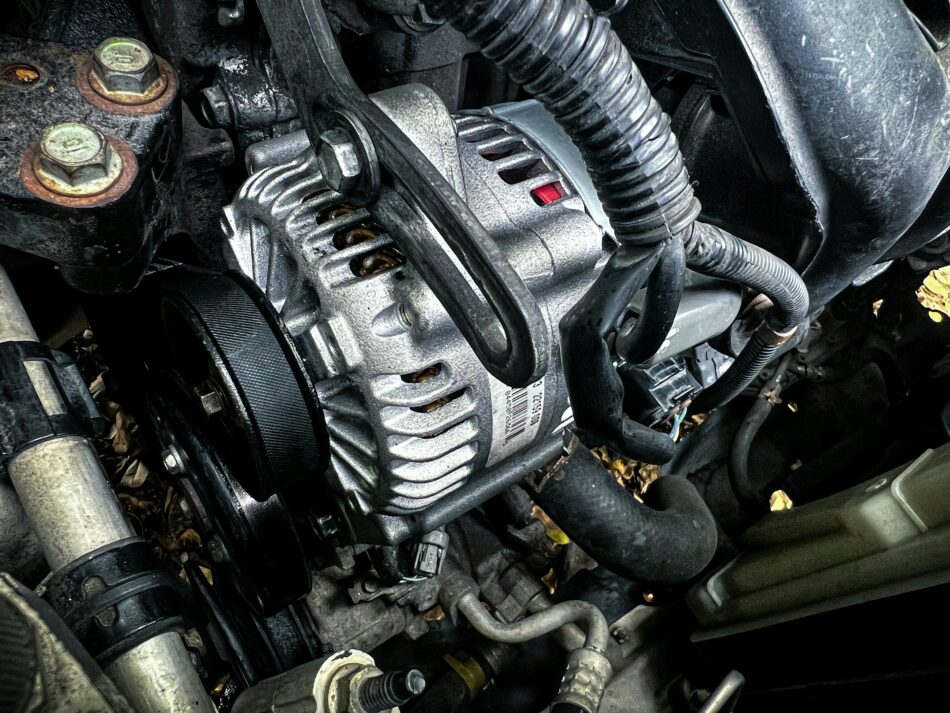
Top Signs of a Failing Alternator
- Inconsistent lights – Headlights or dashboard lights dimming or becoming too bright.
- Dashboard warnings – Battery, “ALT,” or “GEN” warning lights appearing.
- Electrical issues – Malfunctioning accessories like windows, radio, or A/C.
When your car begins to show signs of trouble, it’s crucial to pinpoint the cause promptly. One common culprit behind vehicle malfunctions is a failing alternator. This essential component recharges your battery while the car is running, powering the electrical system.
Understanding the signs and symptoms of a bad alternator can save you time and money, preventing you from being stranded. Let’s explore the most common indicators that your alternator may be on its way out.
1. Dim or Overly Bright Lights
The alternator regulates power to your vehicle’s lights. When it starts to fail, you may notice your headlights and dashboard lights dimming or becoming excessively bright. This fluctuation is a clear sign that your alternator cannot maintain a consistent power output.
2. Warning Lights on the Dashboard
Modern vehicles are equipped with a dashboard light that resembles a battery or is labeled ‘ALT‘ or ‘GEN,’ indicating issues with the charging system. If this light comes on, it’s a direct signal from your car’s diagnostic system that the alternator needs attention.
Functional Failures to Watch For
- Battery troubles – Battery frequently dying or not charging properly.
- Engine stalls – Difficulty starting or frequent stalling due to weak spark plug power.
- Strange sounds – Rattling or grinding noises from worn internal alternator parts.
3. Electrical Failures
The alternator powers all the electrical components in your car. If you start experiencing issues with features like power windows, radio, or air conditioning, it could be a symptom of alternator failure.
Physical or Sensory Clues
- Burning smells – Odor of overheated wires or slipping belts.
- Visual dashboard cues – Warning lights that resemble a battery icon.
- Overall performance drop – Car struggling to stay powered during operation.
4. Battery Problems
Although a dead battery might not directly indicate a bad alternator, alternators charge the battery. If your battery frequently dies or struggles to hold a charge, it might be due to a failing alternator not doing its job properly.
5. Strange Noises
Unusual sounds coming from your car can be alarming. A failing alternator can cause odd noises due to worn bearings or other internal components struggling to function. If you hear rattling or grinding sounds, it’s wise to have your alternator checked.
6. Engine Stalls
For your engine to run smoothly, it needs the electrical power that the alternator provides. If the alternator fails, you may find your engine stalling or difficulty in starting the car, as the spark plugs aren’t receiving enough power.
7. Smell of Burning Rubber or Wires
A malfunctioning alternator can overheat, leading to a burning smell. This odor can result from overloaded and overheating electrical components or a belt slipping on the alternator pulley.
In conclusion
Recognizing these symptoms early can significantly impact your vehicle’s performance and longevity. For further details on how to differentiate between a bad alternator and a bad battery, consider this comprehensive guide from Progressive. Being informed helps you make the right decision about when to seek professional help, ensuring your car remains reliable on the road.


